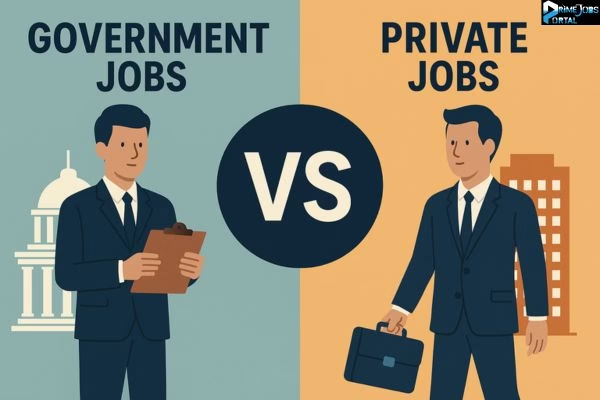Choosing between a government job and a private job is a life-altering decision that shapes your career trajectory, financial stability, and overall lifestyle. Both sectors offer unique advantages and potential drawbacks, making it essential to weigh your options carefully. In this in-depth comparison, we’ll explore the Government Jobs vs. Private Jobs pros and cons of each to help you make an informed, confident choice.
Government Jobs: Unmatched Stability and Perks
Government jobs are highly sought-after for their ironclad security, generous benefits, and structured work environment. These roles span various fields—administration, defense, healthcare, education, and public services—and are known for their long-term reliability.
Advantages of Government Jobs
1.Unshakable Job Security
Unlike the volatile private sector, government jobs provide near-permanent employment, shielding employees from sudden layoffs or economic downturns.
2.Lucrative Benefits & Perks
Government employees enjoy exceptional benefits, including:
- Guaranteed pensions (in most cases)
- Comprehensive health insurance
- Generous paid leave (casual, sick, and earned)
- Housing and travel allowances
- Low-interest loans
3.Superior Work-Life Balance
With fixed working hours, minimal overtime, and strict holiday policies, government jobs allow employees to prioritize family and personal time.
4.Assured Retirement Benefits
Many government roles offer lifetime pensions, ensuring financial peace of mind after retirement.
5.Transparent Career Growth
Promotions are based on seniority and standardized exams, reducing workplace politics and ensuring fair advancement opportunities.
Drawbacks of Government Jobs
- Slow Career Progression
Promotions are often time-bound, meaning employees must wait years for advancements, unlike the merit-driven private sector. - Modest Starting Salaries
Entry-level government pay can be lower than private sector offers, though benefits compensate in the long run. - Bureaucratic Hurdles
Government jobs involve rigid protocols, slow decision-making, and excessive paperwork, which can be frustrating for proactive individuals. - Resistance to Innovation
Work processes tend to be traditional and slow to adapt, limiting creative freedom and modernization. - Strict Regulations
Switching departments or roles is challenging, and employees must adhere to inflexible rules.
Private Jobs: High Rewards with High Risks
Private sector jobs, offered by corporations, startups, and multinational companies (MNCs), are performance-driven, dynamic, and financially rewarding—but come with greater uncertainty.
Advantages of Private Jobs
1.Exceptional Earning Potential
Private jobs, especially in IT, finance, consulting, and tech, offer sky-high salaries, bonuses, stock options, and incentives that far exceed government pay scales.
2.Rapid Career Growth
High performers can climb the corporate ladder quickly, securing senior roles in record time compared to the slow-moving government sector.
3.Cutting-Edge Work Environment
Private companies embrace innovation, offering exposure to advanced technologies, global trends, and skill-enhancing opportunities.
4.Flexible Perks & Incentives
Many private firms provide:
- Remote work options
- Wellness programs (gym memberships, mental health support)
- Free meals, transportation, and childcare
- Performance-based bonuses
5.Global Exposure
MNCs offer international assignments, cross-cultural collaborations, and overseas career opportunities—ideal for ambitious professionals.
Disadvantages of Private Jobs
1.Job Instability
Private sector jobs are profit-driven, leading to sudden layoffs, restructuring, or downsizing during economic crises.
2.Intense Work Pressure
Employees often face tight deadlines, relentless targets, and demanding work hours, leading to stress and burnout.
3.No Guaranteed Job Security
Unlike government jobs, private roles do not promise lifelong employment—employees must continuously prove their worth.
4.Limited Post-Retirement Benefits
Most private firms rely on contributory pension plans , which may not match government pension schemes.
5.Work-Life Imbalance
Many private jobs demand late hours, weekend work, and constant availability, making it hard to disconnect.
Which One Should You Choose? Government Jobs vs. Private Jobs
The best career path depends on your priorities, risk appetite, and long-term goals:
- Opt for a Government Job If:
✅ You value stability and security above all
✅ Work-life balance is non-negotiable
✅ You prefer predictable growth and benefits
✅ Retirement planning is a top priority - Opt for a Private Job If:
✅ You crave high earnings and fast promotions
✅ You thrive in competitive, high-energy environments
✅ You want exposure to innovation and global markets
✅ You’re comfortable with risk for greater rewards
Final Verdict: Stability vs. Growth
Government jobs offer unrivaled security, work-life harmony, and lifelong benefits, making them ideal for risk-averse individuals. On the other hand, private jobs provide higher salaries, rapid advancement, and dynamic challenges, suited for ambitious, adaptable professionals.
Your decision should align with your personality, financial needs, and career aspirations.
Government Jobs vs. Private Jobs which path excites you more? Share your thoughts in the comments!








